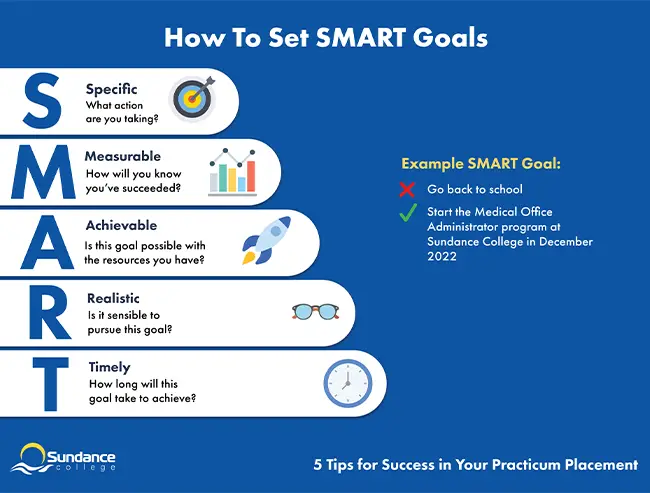Blog / 5 Tips for Success in Your Practicum Placement
5 Tips for Success in Your Practicum Placement

Explore our Diploma Programs
- Business, Hospitality, and Legal
- Health and Human Services
- Technology
Table of Contents
What is a Practicum?
Like internships, practicums are arranged by some colleges and universities as a way for students to gain experience in their field of study. Practicum students are hired to work in an unpaid role related to their program, which provides an opportunity for them to apply what they have learned in the classroom.
Practicums also help students find jobs after graduation. In some cases, practicum placements become permanent positions; we’ve found that up to 50% of our students obtain work through their practicum employer. But that’s not the only reason practicums increase job prospects – they also supply relevant work experience for your resume and create networking opportunities!
Starting a practicum is just like starting any new job: exciting and nerve-wracking, all at once. Whether your practicum begins tomorrow or you’re still planning for your brighter future, preparation is key. These five tips for success will help you put your best foot forward from day one.
1. Do Your Research
The first thing you should do after landing a practicum placement is Google the organization you’ll be working for.
Start by looking up the company story or mission statement. Every organization has a unique purpose and perspective – knowing how your role fits into the big picture will equip you to make better decisions on the job.
Next, research the leadership team. Learning important names and titles ahead of time will make building relationships much easier.
Finally, don’t forget to search for practical information, like location and directions. Planning out your transportation route and travel time will help you avoid unnecessary stress.
2. Set Your Goals for the Practicum
The primary goal of your practicum will be to apply what you have learned about your field, as well as practicing working with others and sharpening your communication skills under the guidance of your practicum provider. While you can’t dictate which duties will be assigned to you during your practicum, you can keep personal goals in mind to pursue if the opportunity arises.
Work with your supervisor to understand their expectations for your role and how your performance will be assessed. Don’t be afraid to share your professional goals as well – you can even prepare some ideas ahead of time to guide the conversation.
We recommend using the SMART goals acronym to set actionable goals. This acronym asks you to create goals that are Specific, Measurable, Achievable, Realistic and Timely.
For example, let’s say you’re a legal assistant student working in a law office for your practicum. Maybe it’s your dream to work for a legal team that specializes in family law.
Rather than setting the goal, “Learn more about family law,” you could set the SMART goal: “Prepare legal research for at least one family law case before the end of my practicum, to ensure I know exactly what is expected.” This meets the SMART goal requirements and provides a clear request to discuss with your practicum supervisor, should the opportunity arise.

3. Ask Thoughtful Questions
If you have trouble admitting when you don’t know something, you’re not alone. However, asking questions is the key to professional development – and a great way to show you’re engaged in your work. You should never be embarrassed about learning new information!
That said, sometimes it’s a good idea to consult other resources before asking your colleagues or supervisor for the answer. If you can’t resolve your query on your own, or need further clarification, then it’s appropriate to ask someone. You might even mention the steps you took to answer your question and ask for advice on resources you could use in the future.
4. Get to Know Your Co-Workers
Networking goes a long way in the professional world. Building friendly relationships with your co-workers not only improves your work environment – these connections could also lead to future opportunities.
Small gestures, like offering a cheerful hello in the morning and engaging in small talk about the weekend, are easy ways to show you care about your colleagues. Ask them questions about themselves and actively listen to their answers. Most importantly, remember names, even if you need to write them in your notes app.
Stay open and approachable, and you’ll know everyone in the workplace in no time!
5. Accept Constructive Feedback
Constructive criticism is an essential part of the learning process, but we’d be lying if we said it never hurt. Learning how to accept feedback positively is its own learning curve, but once you master this skill, you’ll be a much stronger student and employee.
The first rule of receiving feedback is listening – not talking. It’s natural to feel a little defensive when you get negative feedback but try not to make excuses. Hear what the person giving you the feedback is saying; they probably have good intentions. Think about how you could apply their suggestions to future situations.
Remember: you’re allowed to make mistakes. Try to see constructive criticism as an opportunity to improve, rather than a sign of failure.
At times, you may realize the feedback you’ve received isn’t helpful. In these cases, thank the person who provided the feedback. Then, decide what you can use and set the rest aside.
Practicum Student Responsibilities
Practicum students test the skills they’ve learned at school in a supervised setting. The level of independence and responsibility you’re given during a practicum will depend on your field, placement, and supervisor.
Sundance College arranges practicums for students as part of their program. Medical Office Assistant students may find themselves placed at a medical clinic, dentist’s office, or insurance company, while business and legal students may work for a large corporation, a business firm, or a law office. Each practicum setting will have its own expectations and requirements.
Regardless of the circumstances, it’s your responsibility as a practicum student to behave professionally and understand what the role requires of you. Your practicum is a big step on your new career path, and it’s important to leave a positive impression.
How to Put Practicum Experience on Your Resume
One of the best advantages of taking part in a practicum program is gaining work experience to add to your resume. This will set you apart as a new graduate on the job market.
You can add practicum experience to your resume as you would any job – just be sure to note that the role was part of a practicum. Include the title, company, location, and dates, as well as a bullet point list of your duties and achievements. Finally, remember to ask your practicum advisor if they will act as a reference before you complete your program. That way, you’ll be prepared with a reference should a future hiring committee request one.
If you need help incorporating your practicum into your resume, the Career Services team at Sundance College is a great resource. They help students with their resumes, job search, interviews and more.
Are you ready to kickstart your brighter future with a practicum placement? Fill out this form to learn more about the professional diploma programs offered by Sundance College.
Subscribe for more career advice
Blog Categories
Share on:
